The Uganda, the Pearl of Africa, is rapidly becoming one of the leading spots in attracting digital nomads to the country that would offer the best combination of adventure, culture, and remote work experiences. Uganda is home to some of the most beautiful sceneries and animals, as well as the most hospitable living communities and urban centers, which provide the digital nomads with a wonderful experience to live, work, and travel. To make an extended adventure planned, the Uganda eVisa offers an entry solution that is easier than ever before and allows those planning to stay longer in the country to do so.
Understanding the Uganda eVisa
Uganda e Visa is an online travel permit issued to those travelers who desire to have an easy entry into the country. In comparison to a normal travel permit, the eVisa procedure is fully online, eliminating the paperwork problems and long queues.
Key Points About the Uganda eVisa:
- Duration: Typically allows a stay of up to 90 days. Multiple-entry options or extensions are possible for longer-term travelers.
- Application: Completed online, usually approved within 2–5 days.
- Requirements: Passport valid for at least six months, a recent photo, and travel itinerary.
- Flexibility: Enables digital nomads to plan trips across Uganda without physical visits to travel offices.
For long-term digital nomads, this eVisa makes it easier to combine work and travel seamlessly.
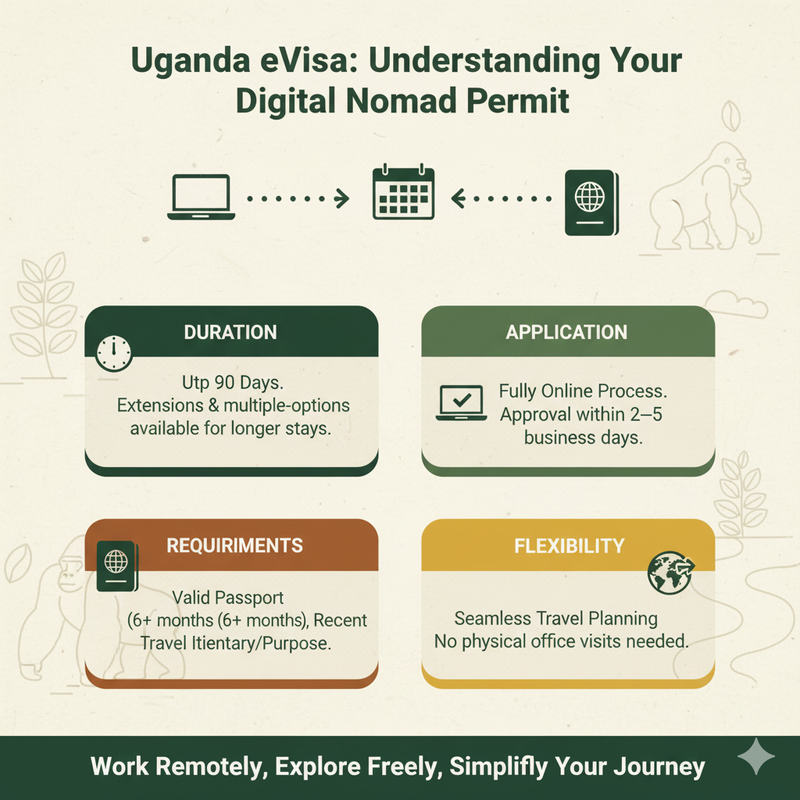
Why Uganda is Perfect for Digital Nomads
Uganda has recently attracted remote workers worldwide because of its unique advantages:
- Friendly Local Communities: Ugandans are welcoming and helpful, making integration into neighborhoods and local culture easier.
- Natural Beauty & Adventure: From gorilla trekking in Bwindi to white-water rafting in Jinja, adventure is always within reach.
- Growing Remote Work Infrastructure: Urban centers offer coworking spaces, cafés with high-speed internet, and accommodations suited for remote work.
- Cultural Immersion: Uganda’s music, dance, markets, and traditional practices offer an enriching experience that complements a nomadic lifestyle.
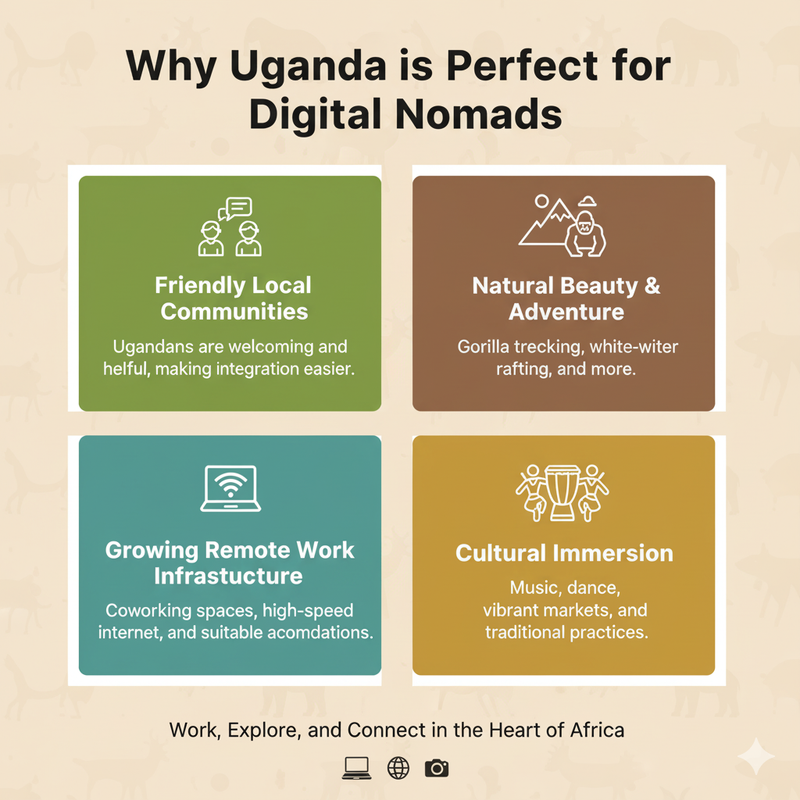
Top Destinations for Digital Nomads
Uganda has a variety of sites to serve digital nomads both in the hectic city capitals and in peaceful lake towns and scenic nature resorts. There are destinations with different charm, infrastructure and lifestyle, and it is easy that the remote workers can make their own decision regarding work, adventure and cultural experiences.
1. Kampala – The Urban Hub
The capital city Kampala is the heartbeat of Uganda and the best place to have digital nomads who do well in an urban environment.
Why Kampala?
- Coworking Spaces: Popular spots like Impact Hub Kampala, The Hive, and Makerere Innovation Hub offer reliable Wi-Fi, networking events, and a collaborative environment.
- Cafés & Remote Work Spots: Cafés such as Café Javas and Café Kili provide comfortable workspaces and a relaxed atmosphere.
- Cultural Activities: Visit craft markets, art galleries, and music events to balance work with cultural immersion.
- Nightlife & Social Life: Kampala has a vibrant nightlife, perfect for networking and socializing after work.

2. Entebbe – Lakeside Serenity
Entebbe is also a better place to work and stay longer in comparison with Kampala because of less hectic lifestyle.
Why Entebbe?
- Proximity to Lake Victoria: Enjoy scenic views and peaceful lakeside walks during breaks.
- Reliable Connectivity: Many accommodations and cafés provide high-speed internet suitable for video calls and remote work.
- Relaxed Pace: Perfect for digital nomads who prefer low-stress environments and less urban noise.
- Outdoor Activities: Visit the Entebbe Botanical Gardens, Uganda Wildlife Education Centre, and nearby beaches.
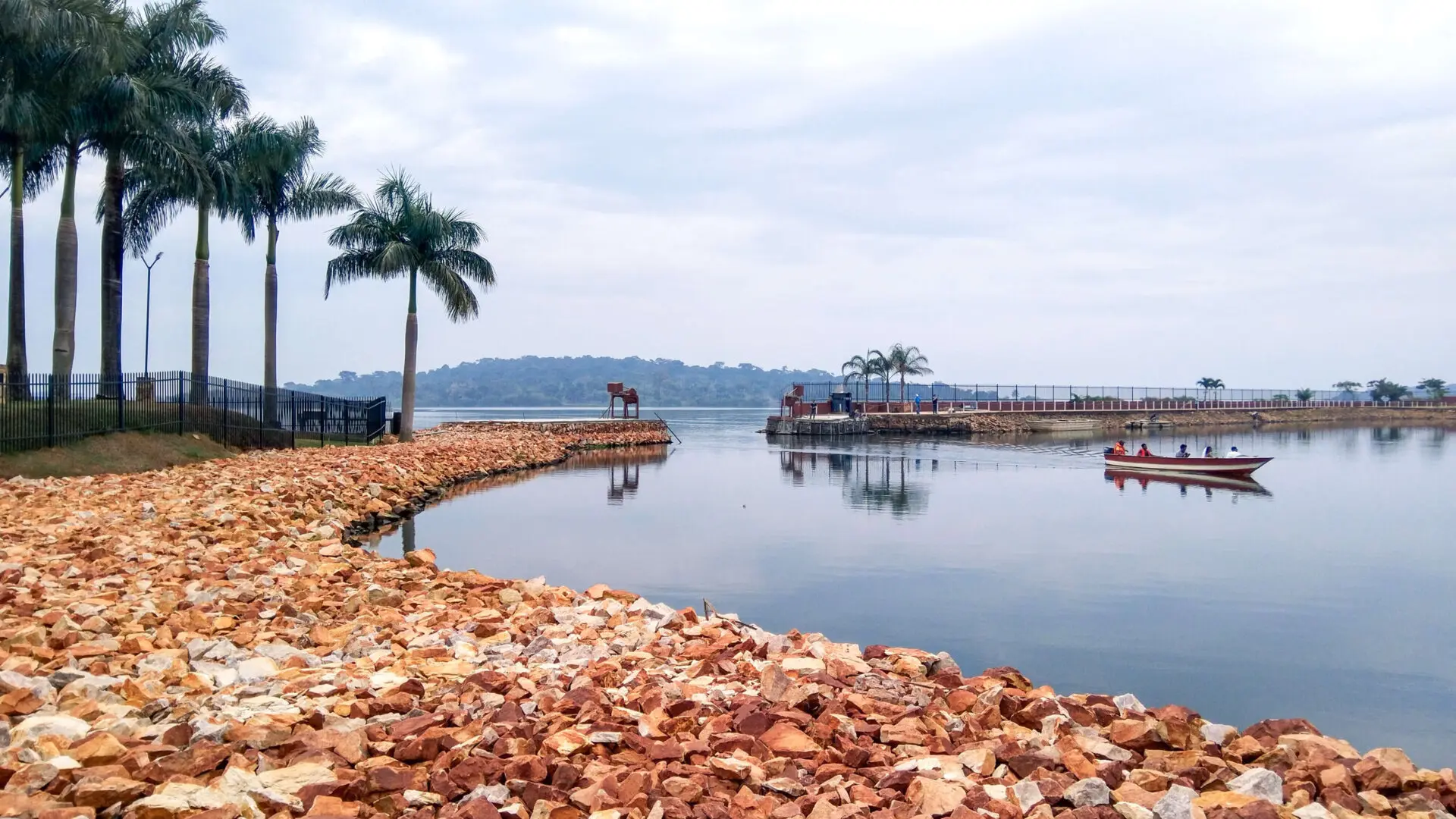
3. Jinja – Adventure Capital
Jinja is the final place that can attract digital nomads who like to balance work with some adrenaline-based activities.
Why Jinja?
- Adventure Opportunities: White-water rafting, kayaking, bungee jumping, and boat tours on the Nile.
- Coworking-Friendly Spots: Cafés and lodges provide strong internet and comfortable workspaces.
- Scenic Beauty: Lush greenery and river views make it easy to work in inspiring surroundings.
- Community & Events: Small but growing community of expats and digital nomads, perfect for networking.
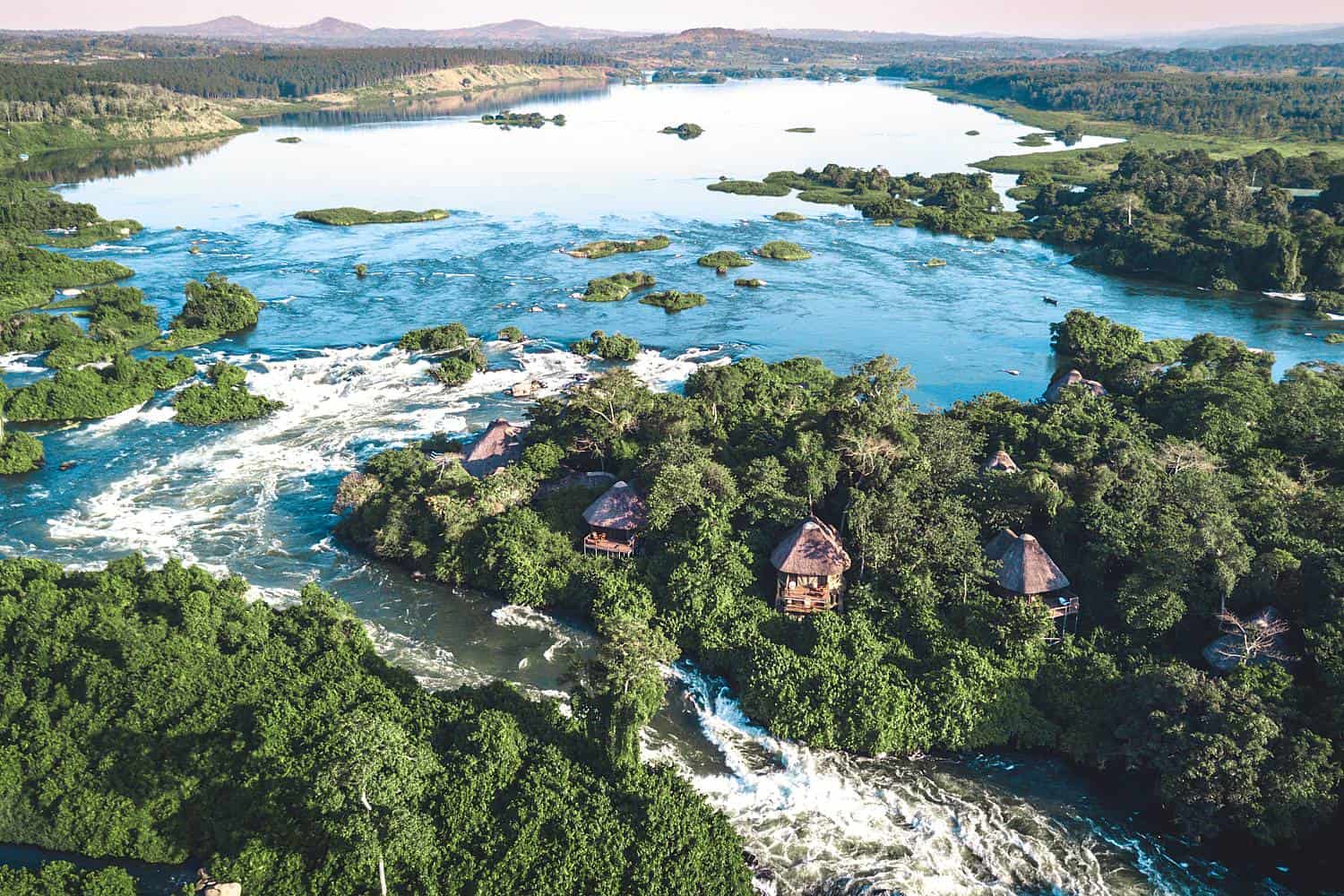
4. Fort Portal – Gateway to Nature
In western Uganda, Fort portal is characterized by green fields, tea fields and volcanoes. It is perfect in terms of tranquility and nature.
Why Fort Portal?
- Nature Escapes: Near Kibale National Park, crater lakes, and tea plantations.
- Work-Life Balance: Quiet atmosphere allows deep focus and creativity.
- Cultural Exposure: Engage with local communities and experience traditional lifestyles.

5. Mbarara – Slow-Paced Productivity
Mbarara offers a combination of city and country lifestyle, the dream of long-term digital nomads that want to find a restful life.
Why Mbarara?
- Affordable Living: Reasonable housing and food costs for extended stays.
- Local Culture: Experience western Ugandan traditions, markets, and festivals.
- Nature & Exploration: Rolling hills, farmland, and local attractions for weekend trips.

Accommodation & Connectivity
Accommodation Tips:
- Look for apartments, guesthouses, or Airbnb rentals with strong Wi-Fi.
- Consider long-term stays at coworking hostels for networking opportunities.
Connectivity Tips:
- Purchase local SIM cards with data plans or portable hotspots.
- Major cities have cafes with fast internet, ideal for meeting clients or video calls.
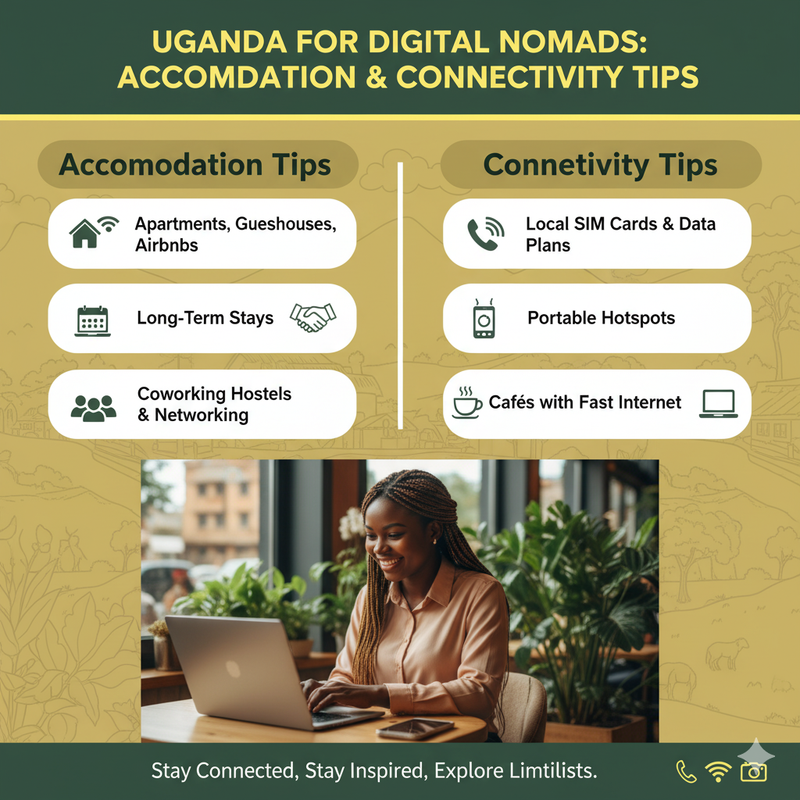
Dining & Lifestyle
- Local Cuisine: Try matoke (steamed plantains), rolex (egg-filled chapati), fresh fish, and local fruits.
- International Food: Kampala and Entebbe offer Italian, Indian, and other global cuisines.
- Healthcare: Accessible in cities; maintain health insurance for emergencies.

Transportation Tips
- Local Transport: Boda-bodas (motorcycle taxis) are common for short trips, while taxis and buses handle city travel.
- Long-Distance Travel: Private car hires or bus services connect major towns.
- Ride-Sharing: Apps like SafeBoda offer safer transportation in urban areas.
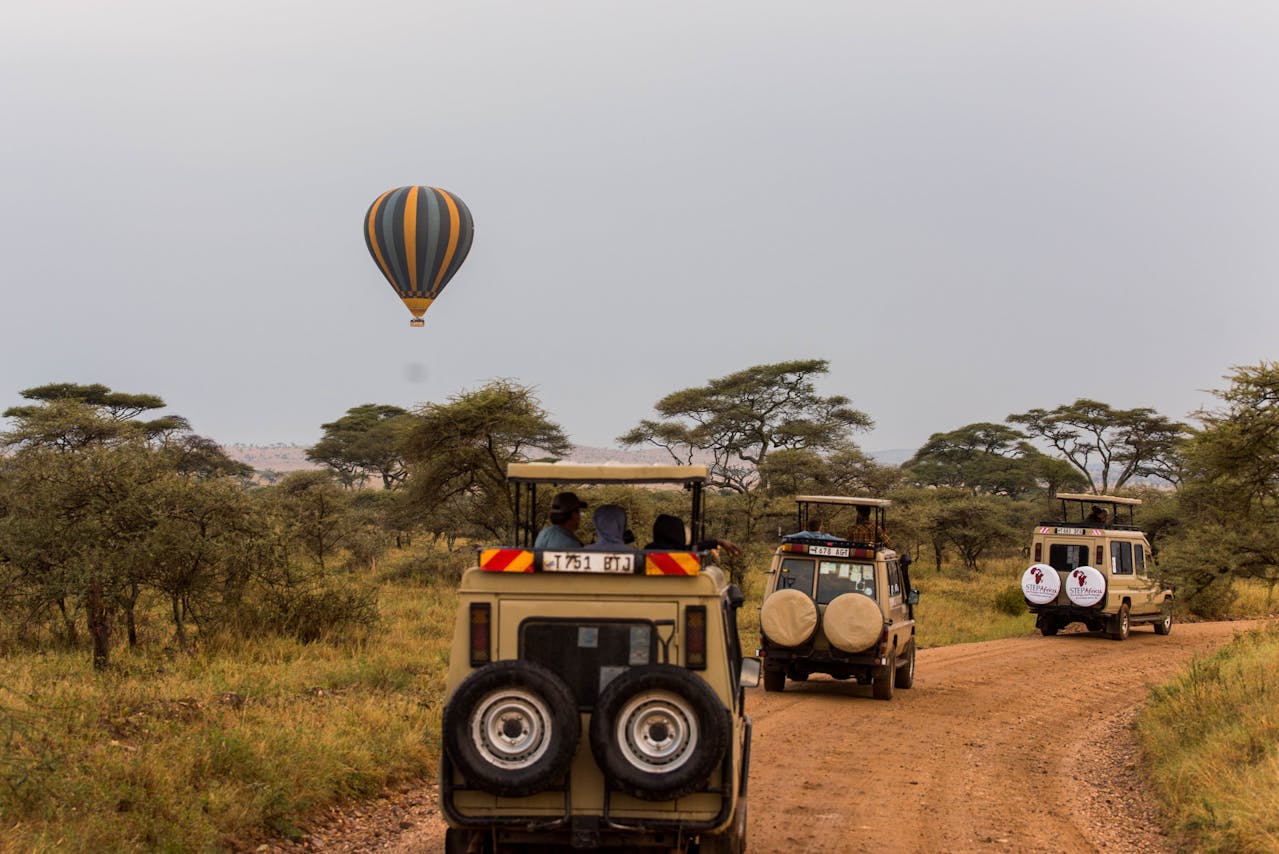
Suggested Monthly Itinerary for Digital Nomads
Week 1–2: Settle in Kampala or Entebbe, explore coworking spaces, local cafés, and city life.
Week 3: Weekend trips to Murchison Falls or Sipi Falls for adventure and relaxation.
Week 4: Visit Jinja for water sports and outdoor activities, return to your base for work.
Week 5–6: Explore Bwindi or Lake Bunyonyi for wildlife experiences and retreats from the urban hustle.
Week 7–8: Integrate into local communities, participate in cultural events, and plan your next adventure.
Hidden Gems for Digital Nomads
- Sipi Falls: Great for hiking and creativity
- Lake Bunyonyi: A peaceful escape with lakeside views
- Bwindi Impenetrable Forest: Gorilla trekking adventure
- Local Markets: Handcrafts, coffee, and cultural immersion
Conclusion
The country of Uganda is a unique place where digital nomads can find cheap living, adventure, culture, and work friendly infrastructure. It has easy eVisa procedures, expanding coworking facilities, breathtaking landscapes and friendly communities that make it the right place to explore over a long period of time. During the time the person lives in busy Kampala, is relaxing in the tranquility of the lakeside environment in Entebbe, wants to experience excitement in Jinja or wants to be into the countryside, Uganda promises a balanced, productive and memorable remote working experience. Uganda is not merely a destination to digital nomads but a lifestyle, offering them freedom in their profession and adventure of a lifetime.
FAQs
Q1: What is the maximum time I can spend in Uganda using eVisa?
Up to 90 days. There are options of extensions or multi-entry.
Q2: Do you find eVisa easy online?
Yes. It is online, easy and the process of approval normally takes 25 days.
Q3: Do we have coworking in Uganda?
Yes, in Kampala and Jinja in particular. These centers provide fast internet, networking and cooperative opportunities.
Q4: Am I able to work when I am on the road?
Absolutely. Remote work is possible with the stable internet and modern accommodations.
Q5: When is the ideal time to visit Uganda?
Ideally, dry seasons are those between June and September and between December and February.
Q6: Is Uganda a safe destination to spend time?
The area is typically secure through elementary precautionary measures, exercising situational awareness, and engaging the locals.
Q7: Are there other digital nomads that I can network with?
Yes. Numerous coworking environments, hostels and online communities support networking and collaborations.
